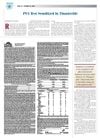 21 citations
,
March 2021
21 citations
,
March 2021 Oral minoxidil effectively treats hair loss, with women needing lower doses (0.25 to 2.5 mg daily) and men needing higher doses (1.25 to 5 mg daily).
11 citations
,
March 2021 in “Cleveland Clinic Journal of Medicine” Treating hair loss in both men and women is effective and improves quality of life.
 39 citations
,
February 2021 in “Journal of The American Academy of Dermatology”
39 citations
,
February 2021 in “Journal of The American Academy of Dermatology” Low-dose oral minoxidil safely treats hair loss, with hypertrichosis as main side effect.
 4 citations
,
November 2020 in “Journal of Cosmetic Dermatology”
4 citations
,
November 2020 in “Journal of Cosmetic Dermatology” Most Facebook posts about hair loss treatments are promotional and not medically supported, with better quality information found on YouTube.
 9 citations
,
November 2020 in “Journal of Inflammation Research”
9 citations
,
November 2020 in “Journal of Inflammation Research” Inflammation affects hair loss; anti-inflammatory treatments may help.
 59 citations
,
July 2020 in “Journal of The American Academy of Dermatology”
59 citations
,
July 2020 in “Journal of The American Academy of Dermatology” Oral minoxidil promotes hair growth but may cause side effects; needs monitoring.
 9 citations
,
April 2020 in “The Journal of Urology”
9 citations
,
April 2020 in “The Journal of Urology” 5α-Reductase inhibitors don't cause depression.
 22 citations
,
March 2020 in “Cosmetics”
22 citations
,
March 2020 in “Cosmetics” Nanotechnology improves minoxidil treatment for hair loss.
 15 citations
,
March 2020 in “Anais Brasileiros De Dermatologia”
15 citations
,
March 2020 in “Anais Brasileiros De Dermatologia” Finasteride may cause lasting sexual, mental, and physical symptoms; use with caution.
30 citations
,
January 2020 in “Fertility and Sterility” Finasteride can cause serious side effects in some men, needing more research for treatment.
 8 citations
,
January 2020 in “Skin appendage disorders”
8 citations
,
January 2020 in “Skin appendage disorders” Saw palmetto supplements may modestly improve hair regrowth with few side effects, but more research is needed.
 26 citations
,
December 2019 in “Neurobiology of Stress”
26 citations
,
December 2019 in “Neurobiology of Stress” Post-finasteride syndrome causes lasting sexual, neurological, and physical side effects in some people after taking finasteride.
1 citations
,
December 2019 in “Indian Journal of Pharmacy Practice”  53 citations
,
August 2019 in “Journal of The American Academy of Dermatology”
53 citations
,
August 2019 in “Journal of The American Academy of Dermatology” Oral minoxidil and topical minoxidil 5% both effectively improve female-pattern hair loss with safe side effects.
 14 citations
,
August 2019 in “Journal of Dermatological Treatment”
14 citations
,
August 2019 in “Journal of Dermatological Treatment” 10% minoxidil solution better promotes hair growth and reduces hair loss without significant side effects.
 117 citations
,
August 2019 in “Drug Design Development and Therapy”
117 citations
,
August 2019 in “Drug Design Development and Therapy” Minoxidil effectively treats hair loss, but use cautiously and monitor side effects.
 4 citations
,
May 2019 in “The World Journal of Men's Health”
4 citations
,
May 2019 in “The World Journal of Men's Health” Taking 5 alpha reductase inhibitor medication slightly increases the risk of depression, especially as you get older.
 18 citations
,
March 2019 in “Journal of The European Academy of Dermatology and Venereology”
18 citations
,
March 2019 in “Journal of The European Academy of Dermatology and Venereology” Finasteride use doesn't cause sexual dysfunction in men with hair loss.
 7 citations
,
March 2019 in “Cancer Epidemiology, Biomarkers & Prevention”
7 citations
,
March 2019 in “Cancer Epidemiology, Biomarkers & Prevention” Finasteride use is not clearly linked to an increased risk of male breast cancer.
 49 citations
,
February 2019 in “The Journal of Clinical Endocrinology and Metabolism”
49 citations
,
February 2019 in “The Journal of Clinical Endocrinology and Metabolism” Use "female pattern hair loss" term, assess androgen excess, treat with minoxidil and other medications if needed.
 38 citations
,
February 2019 in “Clinical Interventions in Aging”
38 citations
,
February 2019 in “Clinical Interventions in Aging” Dutasteride more effectively treats hair loss than finasteride, but may increase risk of altered libido.
 14 citations
,
January 2019 in “Skin appendage disorders”
14 citations
,
January 2019 in “Skin appendage disorders” PFS might be a delusional disorder with potential to become mass psychogenic illness.
 134 citations
,
December 2018 in “Dermatology and Therapy”
134 citations
,
December 2018 in “Dermatology and Therapy” Some vitamins and minerals like vitamin D and iron can help with certain types of hair loss, but more research is needed for others.
 23 citations
,
October 2018 in “Expert Opinion on Drug Safety”
23 citations
,
October 2018 in “Expert Opinion on Drug Safety” Consider benefits and risks of new alopecia treatments for safety.
 8 citations
,
October 2018 in “Dermatologic Therapy”
8 citations
,
October 2018 in “Dermatologic Therapy” About 41% of Indian hair loss patients have low enzyme activity that affects hair loss treatment effectiveness, with men affected more than women. Testing for this can guide treatment.
 20 citations
,
August 2018 in “The World Journal of Men's Health”
20 citations
,
August 2018 in “The World Journal of Men's Health” Finasteride may increase erectile dysfunction risk in patients with benign prostatic hyperplasia.
4 citations
,
July 2018 in “International Journal of Research in Dermatology” Topical finasteride with minoxidil is effective for treating hair loss and may reduce the need for oral finasteride.
 36 citations
,
June 2018 in “Journal of Dermatology”
36 citations
,
June 2018 in “Journal of Dermatology” Use finasteride, dutasteride, and minoxidil for hair loss treatment.
 30 citations
,
May 2018 in “Experimental Dermatology”
30 citations
,
May 2018 in “Experimental Dermatology” The conclusion is that future hair loss treatments should target the root causes of hair thinning, not just promote hair growth.
 22 citations
,
April 2018 in “Pharmaceutics”
22 citations
,
April 2018 in “Pharmaceutics” New methods improve how well skin treatments work by helping drugs get through the skin barrier.
 42 citations
,
February 2018 in “International Journal of Molecular Sciences”
42 citations
,
February 2018 in “International Journal of Molecular Sciences” Minoxidil boosts hair growth by triggering growth factor release from specific stem cells.
11 citations
,
January 2018 in “International Journal of Trichology” The true incidence of post-Finasteride syndrome is unclear, and more research is needed.
40 citations
,
January 2018 in “International journal of trichology” Healthy scalp reduces hair loss by managing oxidative stress.
 8 citations
,
December 2017 in “Cancer Medicine”
8 citations
,
December 2017 in “Cancer Medicine” Finasteride use may increase the risk of male breast cancer.
 145 citations
,
November 2017 in “Journal of The European Academy of Dermatology and Venereology”
145 citations
,
November 2017 in “Journal of The European Academy of Dermatology and Venereology” Use minoxidil for hair loss treatment; assess results after 6 months.
 6 citations
,
April 2017 in “JAMA Dermatology”
6 citations
,
April 2017 in “JAMA Dermatology” Men's hair loss is not linked to their sex hormone levels, except for lower DHEAS in those with hair loss.
 15 citations
,
February 2017 in “International Journal of Women's Dermatology”
15 citations
,
February 2017 in “International Journal of Women's Dermatology” Hair aging and loss are caused by genetics, hormones, environment, and grooming, with treatments like minoxidil effective for certain types of hair loss.
 79 citations
,
January 2017 in “Dermatology practical & conceptual”
79 citations
,
January 2017 in “Dermatology practical & conceptual” Correcting nutrient deficiencies may help with hair loss, but the benefits of supplements without a deficiency are uncertain and could be harmful.
21 citations
,
January 2017 in “Dermatology Online Journal” Finasteride and dutasteride can cause sexual problems like impotence and low libido.
 22 citations
,
January 2017 in “Indian Dermatology Online Journal”
22 citations
,
January 2017 in “Indian Dermatology Online Journal” Body hair transplants can treat baldness but differ from scalp hair and need more research on long-term results and side effects.
 57 citations
,
July 2016 in “The Journal of Sexual Medicine”
57 citations
,
July 2016 in “The Journal of Sexual Medicine” 5α-reductase inhibitors increase the risk of sexual dysfunction, especially in men with enlarged prostate.
 19 citations
,
January 2016 in “Annals of Dermatology”
19 citations
,
January 2016 in “Annals of Dermatology” Dutasteride is safe and effective for treating hair loss, but may decrease libido.
4 citations
,
January 2015 in “Indian Journal of Dermatology” 15.33% of young Caucasian men have severe hair loss, with higher rates in Jewish men and links to age, BMI, and possibly metabolic syndrome.
 32 citations
,
January 2015 in “Indian Dermatology Online Journal”
32 citations
,
January 2015 in “Indian Dermatology Online Journal” Minoxidil and finasteride combo maintains hair density effectively.
 50 citations
,
July 2014 in “International Journal of Clinical Pharmacology and Therapeutics”
50 citations
,
July 2014 in “International Journal of Clinical Pharmacology and Therapeutics” New finasteride solution effectively reduces baldness-causing hormone, potentially with fewer side effects.
 151 citations
,
May 2014 in “American Journal of Clinical Dermatology”
151 citations
,
May 2014 in “American Journal of Clinical Dermatology” Effective treatments for male pattern baldness include oral finasteride and topical minoxidil, while topical minoxidil is best for female pattern baldness.
 23 citations
,
December 2013 in “Regenerative Medicine”
23 citations
,
December 2013 in “Regenerative Medicine” Hair follicle culture helps develop new treatments for hair loss.
 24 citations
,
December 2013 in “Sexual medicine reviews”
24 citations
,
December 2013 in “Sexual medicine reviews” Finasteride can cause sexual problems and depression in young men.
 17 citations
,
October 2013 in “Plastic and reconstructive surgery. Global open”
17 citations
,
October 2013 in “Plastic and reconstructive surgery. Global open” Male pattern baldness may be caused by scalp pressure on hair follicles, which increases with age and leads to a cycle of hair loss. This process is not directly determined by genes.
 54 citations
,
September 2013 in “Fertility and Sterility”
54 citations
,
September 2013 in “Fertility and Sterility” Finasteride can reduce fertility in some men, but stopping it increases sperm count.
 66 citations
,
June 2013 in “Journal of Dermatological Treatment”
66 citations
,
June 2013 in “Journal of Dermatological Treatment” Finasteride and dutasteride effectively treat hair loss, but may cause side effects like sexual dysfunction and depression.
 98 citations
,
October 2012 in “Dermatologic Clinics”
98 citations
,
October 2012 in “Dermatologic Clinics” Eating the right nutrients can improve hair health, but taking extra supplements usually doesn't help unless you have a deficiency.
 152 citations
,
April 2012 in “Recent Patents on Inflammation & Allergy Drug Discovery”
152 citations
,
April 2012 in “Recent Patents on Inflammation & Allergy Drug Discovery” Minoxidil treats hair loss, promotes growth, has side effects, and has recent patents.
 218 citations
,
December 2011 in “Advances in Urology”
218 citations
,
December 2011 in “Advances in Urology” The document concludes that the 5 alpha-reductase enzymes are important in steroid metabolism and related to various human diseases, with inhibitors used to treat conditions like male pattern baldness and prostate issues.
 88 citations
,
February 2011 in “Journal of Dermatological Science”
88 citations
,
February 2011 in “Journal of Dermatological Science” Minoxidil helps hair growth by activating the β-catenin pathway.
 4 citations
,
January 2011 in “International Journal of Trichology”
4 citations
,
January 2011 in “International Journal of Trichology” Accidental findings have led to new hair treatment discoveries, like using blood pressure and diabetes medications for hair loss and unwanted hair.
 223 citations
,
December 2010 in “The Journal of Sexual Medicine”
223 citations
,
December 2010 in “The Journal of Sexual Medicine” Some patients taking finasteride or dutasteride may have ongoing sexual problems and depression even after stopping the medication.
 151 citations
,
August 2010 in “British Journal of Dermatology”
151 citations
,
August 2010 in “British Journal of Dermatology” Guidelines for diagnosing common hair loss include detailed history, clinical examination, and various diagnostic techniques.
 11 citations
,
March 2010 in “International Journal of Andrology”
11 citations
,
March 2010 in “International Journal of Andrology” Finasteride 1-mg doesn't harm sperm or pregnancy chances.
28 citations
,
January 2009 in “Journal of Cutaneous and Aesthetic Surgery” Serenoa repens is not proven effective for hair loss and may delay prostate cancer detection.
33 citations
,
January 2009 in “Journal of Cutaneous and Aesthetic Surgery” Finasteride reduces prostate cancer risk but may affect ejaculatory volume and requires careful consideration for young men.
 41 citations
,
January 2009 in “International Journal of Trichology”
41 citations
,
January 2009 in “International Journal of Trichology” 58% of men aged 30-50 have hair loss, with severity increasing with age.
 31 citations
,
September 2008 in “International Journal of Andrology”
31 citations
,
September 2008 in “International Journal of Andrology” 5-alpha-reductase inhibitors may cause a low incidence of erectile dysfunction that decreases over time.
 225 citations
,
July 2007 in “The Journal of Sexual Medicine”
225 citations
,
July 2007 in “The Journal of Sexual Medicine” Knowing about finasteride's sexual side effects increases reported dysfunction.
 1 citations
,
May 2007 in “International Journal of Dermatology”
1 citations
,
May 2007 in “International Journal of Dermatology” Minoxidil, when applied to the scalp, can stimulate hair growth but effects vary, stop if treatment ends, and it may cause side effects like fluid retention.
 89 citations
,
December 2006 in “Lancet Oncology”
89 citations
,
December 2006 in “Lancet Oncology” Taking 1 mg/day finasteride for hair loss significantly lowers PSA levels in men, which may affect prostate cancer screening.
 1 citations
,
October 2006 in “Oncology times”
1 citations
,
October 2006 in “Oncology times” Finasteride improves prostate cancer detection in PSA test.
 80 citations
,
April 2006 in “Clinical Interventions in Aging”
80 citations
,
April 2006 in “Clinical Interventions in Aging” Minoxidil and Finasteride are effective for male baldness; more research is needed for hair aging treatments.
 137 citations
,
March 2006 in “Cns Drug Reviews”
137 citations
,
March 2006 in “Cns Drug Reviews” Finasteride treats enlarged prostate and hair loss, but may cause side effects in some patients.
 23 citations
,
October 2005 in “Dermatologic Surgery”
23 citations
,
October 2005 in “Dermatologic Surgery” Finasteride improves surrounding scalp hair and increases hair density after hair transplant.
 35 citations
,
March 2005 in “Journal of Investigative Dermatology”
35 citations
,
March 2005 in “Journal of Investigative Dermatology” Potassium channel openers like minoxidil help hair grow by acting on hair follicles.
 44 citations
,
July 2004 in “Archives of Dermatology”
44 citations
,
July 2004 in “Archives of Dermatology” Finasteride for hair loss has minimal impact on sexual function.
 34 citations
,
January 2004 in “Revista do Hospital das Clínicas”
34 citations
,
January 2004 in “Revista do Hospital das Clínicas” Finasteride may worsen infertility in men with existing issues, but stopping it can improve sperm health.
 36 citations
,
September 2001 in “Journal of The European Academy of Dermatology and Venereology”
36 citations
,
September 2001 in “Journal of The European Academy of Dermatology and Venereology” Finasteride doesn't reduce sexual function in people with hair loss.
 236 citations
,
July 2001 in “Trends in Molecular Medicine”
236 citations
,
July 2001 in “Trends in Molecular Medicine” Future hair loss treatments should aim to extend hair growth, reactivate resting follicles, reverse shrinkage, and possibly create new follicles, with gene therapy showing promise.
 129 citations
,
October 2000 in “British Journal of Dermatology”
129 citations
,
October 2000 in “British Journal of Dermatology” Finasteride helps increase hair growth in men with hair loss.
 104 citations
,
October 1999 in “The Journal of Urology”
104 citations
,
October 1999 in “The Journal of Urology” Finasteride doesn't harm male fertility or sperm quality, but may slightly reduce ejaculate volume.
 125 citations
,
January 1999 in “Drugs”
125 citations
,
January 1999 in “Drugs” Finasteride effectively treats baldness but may cause sexual side effects.
 227 citations
,
January 1998 in “Journal of Endocrinology”
227 citations
,
January 1998 in “Journal of Endocrinology” Cells from balding scalps have more androgen receptors than cells from non-balding scalps.
 416 citations
,
September 1997 in “Journal of Investigative Dermatology”
416 citations
,
September 1997 in “Journal of Investigative Dermatology” People with hair loss have more androgen receptors and enzymes in certain follicles, with men and women showing different patterns.
 25 citations
,
June 1990 in “Journal of Pharmaceutical Sciences”
25 citations
,
June 1990 in “Journal of Pharmaceutical Sciences” Longer contact time increases minoxidil absorption, but doesn't affect metabolism.
 45 citations
,
October 1988 in “British Journal of Clinical Pharmacology”
45 citations
,
October 1988 in “British Journal of Clinical Pharmacology” Using topical minoxidil for baldness can cause heart problems, especially in those with heart disease.
 28 citations
,
March 1987 in “Journal of The American Academy of Dermatology”
28 citations
,
March 1987 in “Journal of The American Academy of Dermatology” Minoxidil may help hair growth after transplant surgery.















































































